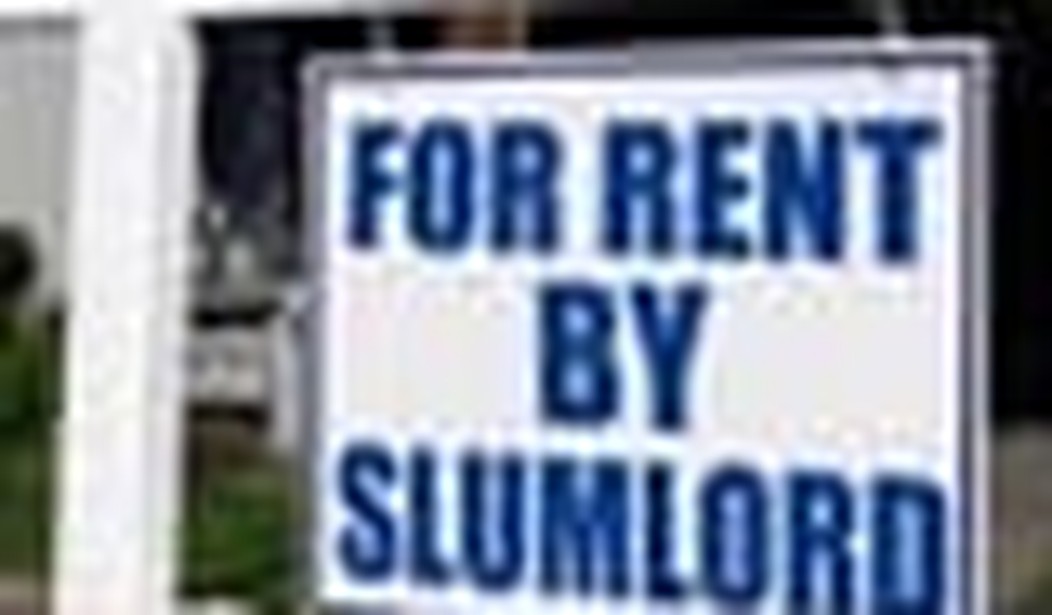If you dislike your health insurer now, just wait until politicians impose price controls that make your insurer act like a slumlord. Expect worse customer service, skimpier plans, and more claim denials.
Price controls on rental properties encourage landlords to become slumlords. Forbidden from making a profit by renting at market rates, to make a living landlords must skimp on quality and service rather than please customers. The same will result from insurance price controls: lousy policies for people with preexisting conditions or for anyone who might get sick.
That is, everyone.
Insurance price controls are quite fashionable with politicians these days. Both houses of Congress passed health care bills mandating community rating, which requires insurers to charge the same premiums regardless of health status.
In President Obama’s February 22 proposal is a “Health Insurance Rate Authority.” “If a rate increase is unreasonable and unjustified,” says Obama’s proposal, “health insurers must lower premiums, provide rebates, or take other actions to make premiums affordable.”
Such price controls should be no surprise, as ObamaCare emulates the “Massachusetts model” for so-called “reform”: mandatory insurance, employer mandates, subsidies, and Medicaid expansion. Responding to skyrocketing premiums and treatment costs, Massachusetts Governor Deval Patrick wants to increase the state’s authority to ban premium increases.
In Colorado, House Bill 1008 would forbid insurers from charging women higher premiums than men, though women’s claims are more costly. Do the bill’s sponsors plan to prohibit life insurers from charging men more than women, despite men’s higher costs?
“Government efforts to regulate prices … have invariably failed,” states a Progressive Policy Institute report on health care price controls. Insurance price controls are no exception.
They encourage insurers to drive away those who need insurance most.
Insurance price controls force insurers to lose money on sick people. To avoid losses, insurers will design policies that are unattractive to high-risk customers. “If you think insurers mistreat the sick now, just wait until price controls turn every single sick person into a $15,000 liability. Insurers would go to even greater lengths to avoid and dump the sick; those that didn’t would go out of business,” explains Cato Institute scholar Michael Cannon.
Politicians could respond by mandating that all policies cover certain benefits and have low deductibles. Insurers would adapt by further emulating slumlords: denying claims and skimping on customer service and provider networks to drive away the sick. Such mandates would also raise premiums for everyone and outlaw catastrophic insurance policies, which happen to be the only plans whose costs are not skyrocketing.
“Individual insurance markets deteriorated” in states that have imposed insurance price controls, concludes a Milliman actuarial study. “Insurance companies chose to stop selling individual insurance” and “premium rates tended to increase, sometimes dramatically.” Price controls also lead to an “increase in the total number of uninsured persons,” says leading health economist Mark Pauly.
Instead of encouraging insurers to avoid sick people, politicians should allow insurers to compete for their business. Leave insurers free to risk-rate premiums and compete for customers based on quality and price. If necessary, subsidize premiums for high-risk consumers, as high-risk pools do. This avoids the slumlord incentives of price controls.
Individual insurance markets pool risk well without price controls. “High risks are not charged premiums that fully reflect their higher risk,” concludes a study published in Health Affairs. Professor Pauly found that high-risk customers pay 1.6 times those of lower-risk customers while incurring four times more expenses.
Markets can provide peace of mind for those who are still healthy. For example, you can guarantee your future insurability by buying the optional “Continuity” rider with a UnitedHealth insurance plan. This is a version of what economists call “health status insurance,” which pays for premium increases associated with changes in health status.
“Ultimately, government price regulation will always fail because it does not change the underlying economic forces driving up prices,” the Progressive Policy Institute report concludes. Indeed. States mandate that all policies cover costly benefits, and then prohibit us from buying more affordable policies available in other states. Federal tax policy limits competition and prudent spending by chaining us to our employers’ plans and punishing those who pay cash for treatment instead of using insurance. Medicare and Medicaid also increase premium costs.
Politicians should address these issues instead of encouraging slumlord health insurers.









Join the conversation as a VIP Member